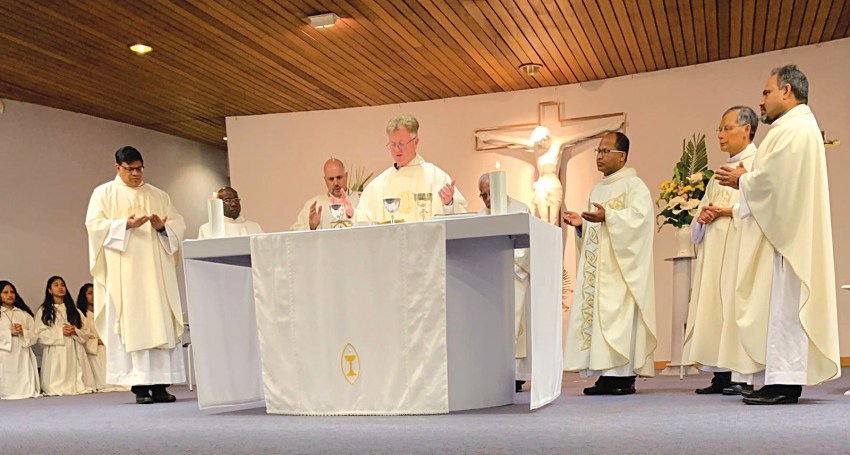Celebrating 125 years of Oblates in Australia
News
The courage and faith of the pioneering Oblates of Mary Immaculate were recognised when the St Pius X community gathered recently to celebrate 125 years of missionary commitment in Australia.

The Hillcrest/Dernancourt parish has partnered that mission for 63 of those years, with 41 Oblate priests serving the community since 1957.
A commemorative Mass held on September 20 in St Pius X Church was presided by Administrator Delegate Fr Philip Marshall and the homily was delivered by Fr Christian Fini, the Provincial of the Australia Province and the China Delegation.
Fr Mathewraj, parish priest of Dernancourt, reminded those present that the celebration was not simply another date on the parish’s liturgical calendar but a “proud moment for the De Mazenod family to give thanks to God for his divine providence and blessings on the Oblates’ apostolate and ministry”.
Advertisement
The Oblates of Mary Immaculate is a missionary congregation founded by Charles Joseph Eugene De Mazenod (later Bishop of Marseilles) in Aix-en-Provence, France, on January 25 1816. He was canonised in Rome on December 3 1995 by Pope John Paul II and was declared patron of the Family Apostolate.
Today, Oblates minister in 67 countries, including the North Pole. One of the well-known sayings of De Mazenod, as mentioned also in the Preface to the Rules and Constitutions of the Oblates, is to strive ‘first to make people human, then make them Christians and finally saints’.
During his homily Fr Fini stressed the fact that “on an occasion like this it would be easy to list the achievements of the parish community and the Province”. However, he said he would rather reflect on the early days of Oblate engagement, on the courage and faith of the pioneers in all the ministries undertaken by the Oblates and focus attention on the coming 125 years where modern communication technology and a world where borders are disappearing bring new challenges and opportunities to spread the values of God’s Kingdom.
The foundation for the mission in Australia began in 1893 when the proposal for Oblate missionaries to plant their tent in Australia was first mooted. In a Provincial Council meeting held in Inchicore, Ireland, on August 13 1893, there were two simple lines discussing a new mission to be undertaken ‘Down Under’. The Provincial of the Anglo-Irish Province read two letters from Cardinal Moran of Sydney negotiating on behalf of the Bishop of Perth where a Reformatory and an Industrial School in Western Australia were to be offered to the Oblates with a mission territory in Fremantle on condition that the two schools were accepted. The Oblates agreed.
The first team of Missionary Oblates arrived in Fremantle in 1894, with the task of providing pastoral care to the small Christian-Catholic community which numbered around 250 people. The Catholic community had already constructed and furnished a small church dedicated to St Patrick. The missionary team of three included Fr Matthew Gaughren, the Provincial of the Anglo/Irish Province, underlining the importance and weight given to the Australian mission.
The initial take off and stabilisation of the Australian mission was not smooth and was riddled with numerous challenges. But the Oblates lived up to their call of being ‘specialists in difficult missions’.
Advertisement
Turning the clock towards the present and future times, Fr Fini noted with concern that the Oblates in Australia will be called upon to face new challenges.
These will be identifying the new poor, sustainability of new and existing ministries, attracting new vocations (a problematic area faced by the universal Church), grappling with the demands made on the Church post-Royal Commission, and coping with a digital age and the changing demographics of the Province.
“Will the Oblates in Australia have the same faith and courage of the founding fathers who sacrificed more than an arm and a leg for the sake of the Kingdom?” he asked. “Only time will tell.”
He suggested that if the Oblates were to have the benefit of another 125 years of history in the Australian Church they needed to search for ways of working in collaboration with the communities they serve.







Comments
Show comments Hide comments